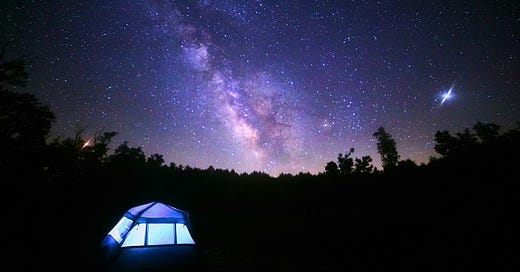All of us follow a “script” or a routine. As the earth turns, revealing and hiding the sun predictably every morning and night, so each of our days often looks similar to the one before: work, pray, eat, rest, play, on repeat. Rhythms and familiar routines ground our days, weeks, and even our years (hello, beloved Christmas traditions!). Like the reliable pattern of strong ocean waves, steadily crashing onto the shore, the rhythm of our days is both inevitable and good.
Sometimes, though, I like to find ways to cultivate moments to remember. Moments that stand out, like a rugged mountain peak in the distance, ensconced in a wisp of cloud. In The Power of Moments by Chip & Dan Heath, the authors explore what makes some experiences more memorable than others:
Familiarity and memorability are often at odds. If you’re looking to create memorable moments, you’ve got to break the script.
This morning, I asked my children what lunch we’ve eaten that has been the most memorable. My 10-year-old daughter immediately answered, “ice cream!” When I asked what dinner I’ve made that they remember best, she again piped up, “cookies!” I smiled. Of course they recall with clarity the one time I fed them ice cream for lunch; who wouldn’t? (The day I fed my children ice cream for lunch was indeed a memorable one; the shock on their faces as I scooped bowls of creamy delight instead of our usual fare was priceless.) The rarity of those meals made them inherently memorable.
Camping is one of the best ways to break the script of daily routine. Sleeping outside under the stars (if you’re fortunate enough to be somewhere dark enough), waking to a chorus of birds, and traipsing about under a canopy of trees is delightfully memorable because it is all so different from our daily rhythms. We have only been camping as a family for a few years, but in those experiences we have learned a lot about how to make camping work.
We are by no means camping experts. If you’re looking for elaborate lists of gear to purchase and tips on packing your car just right, you won’t find those here. I’m just sharing what I have learned in the past few years as we have deliberately chosen to become a Family Who Camps.
My parents never took me camping, and you know why? Because they loved me.
-Jim Gaffigan
My 10 Camping Tips
Decide to enjoy it. Accept that things will be dirty, smoky, buggy, sweaty, and less-than-ideal. And that’s okay. Camping is not comfortable or convenient, but it is like nothing else you do, and that is why it is so memorable. (It also helps to laugh about things that go wrong and the quirks of camping. Jim Gaffigan’s bit on camping is perfection.)
The first time is always the hardest. If I could give one piece of advice to myself back before our first family camping trip, it would be this: Don’t give up after your first trip. The 24-hours leading up to departure are like transition during labor: you will question everything and wonder why, in a saner moment, you would actually choose to do something this difficult. Keep going; I promise that by the end, you will consider every ounce of effort worth it.
Do all of your laundry before leaving home. I know, I know. I just informed you that you would be a frazzled mess before leaving home to go camping, but guess what? You will be even more of a frazzled mess when you get home, and when you see the laundry that needs to be done upon returning, you will be grateful if all your laundry baskets at home are empty.
Have a meal all ready to eat once you arrive home. This could be a subcategory of #3, which should just be titled: Give some Gifts to your Future self. Again, when you arrive home from camping you will be spent, exhausted, bone-tired. To have a pot of soup or sandwich ingredients all ready in the fridge to nourish your incredible family after an adventure like camping is the best feeling in the world. After airing out tarps, unloading endless gear, and scouring dirt-covered children, you will be thankful for a meal you don’t have to cook.
Go with friends. Camping is 1000x more fun if you go with friends or family. If you forget something important (like matches or hand soap) chances are, someone in your group will have it. Also, shared experiences are better than isolated ones: our joy is enhanced and suffering is diminished when we experience it with others. And more children means more chances for
injuryreally fun times for everyone!Create a Master Packing List. Every time you go camping, just print out your list a week before departure and start shopping/gathering your gear. (If you make the same meals every time, which we do, this works even better. When camping, simple really is best.)
Plan your first meal at camp and your last meal to be the easiest. Setting up/taking down camp takes (at least) 1-2 hours, so go easy on yourself with simple, low-prep or even no-cook meals. On the morning of our last day while we are taking down camp, I always plan a no-cook breakfast of fruit, yogurt, and something already made like muffins.
Camp during the best weather for your area. For here in Texas, that’s right now, and again in October-November. My family in Canada camps in the winter in the snow (!), which sounds unforgettable, but probably not ideal for a camping novice. Beautiful weather while camping covers a multitude of ills.
Let your children learn survival skills. Our oldest son, 14, built all of our fires when we camped last week, and he loved it (no surprise there). The first night it took him longer than he hoped, and he nearly gave up, but we told him to keep going, and he finally had success. Camping is the perfect setting for so many learning experiences: fishing, using a compass, setting up a tent or even building a structure with natural materials, cooking over a fire, identifying edible (and poisonous!) plants, and so much more.
Prepare to be astonished. Camping is like having babies: the more you have/the more trips you take, the more you will be able to enjoy it. Take a sketchbook or nature journal, paints & a camera, and look around you; everywhere you turn, the glory and beauty of creation is undeniable and astonishing. God’s first book is easiest to read when we immerse ourselves in it.
Books for Further Reading
If you’d like more inspiration and research on why spending time in nature is critical for the healthy development of children, these four books are a great place to start:
Barefoot and Balanced by Angela Hanscom
This book explores how unscructured play (hours per day if possible!) outdoors develops a child’s “sensory, motor, and executive functions” as well as prevents injury; children who are allowed to take appropriate risks outdoors are better able to assess danger in future situations and ultimately have fewer injuries than children who are not permitted to do risky things like climb trees and clamber over boulders.
Last Child in the Woods by Richard Louv
An in-depth look at how expoisure to nature is vital to a child’s development—"physical, emotional, and spiritual,” as well as a potent therapy for “depression, obesity, and ADD.”
There’s No Such Thing as Bad Weather by Linda McGurk
Fascinating contrast between modern American and small-town Swedish culture, this book invites creativity in approaching the difficulties (such as wet/frigid temperatures) inherent in the seemingly simple advice to “just go outside more.”
Outdoor Kids in an Inside World by Steven Rinella
The author draws on extensive experience as a father, teaching his own children to fish, garden, and even hunt.
We were all meant to be naturalists, each in his degree, and it is inexcusable to live in a world so full of the marvels of plant and animal life and to care for none of these things.
-Charlotte Mason
Did you grow up camping? Do you currently camp with your children? What tips would you add to this list?






Great advice for the novice campers out there. Thanks for sharing your wisdom, Shannon.
A walk in the woods by bill bryson is another good one